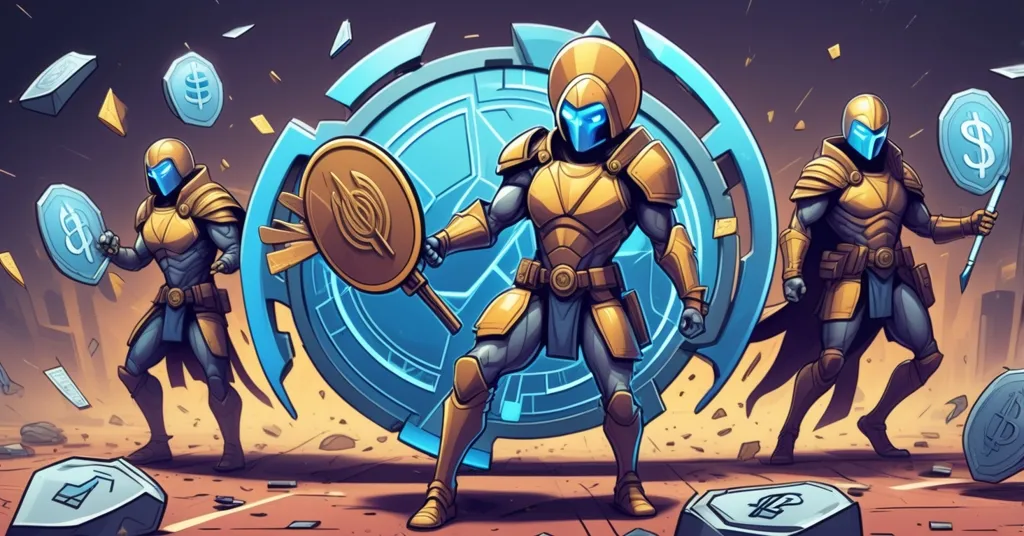Digitap vs. Pepenode vs. Tapzi: Which Utility Crypto Wins in 2023?

Digitap vs. Pepenode vs. Tapzi: Best Utility Crypto Projects in 2023?
Bitcoin reigns as the undisputed titan of decentralization, but the altcoin battlefield is where new ideas fight for relevance. Three projects—Digitap, Pepenode, and Tapzi—offer a snapshot of today’s crypto market, where the hunger for real utility is starting to eclipse empty hype. Let’s tear into these contenders to see who’s delivering tools for the financial revolution and who’s just peddling hot air.
- Digitap: A working app for fiat-crypto transactions, Visa-powered cards, and over $1.4M raised in presale.
- Pepenode: A meme token riding on laughs and fleeting social buzz, with no practical use.
- Tapzi: A fintech vision for decentralized payments, but stuck in early development with no live product.
Digitap: Bridging Fiat and Crypto with Real Tools
Digitap isn’t just another altcoin with a fancy whitepaper—it’s got a live app that tackles one of crypto’s biggest hurdles: making digital assets usable in the real world. Imagine paying for groceries with Bitcoin without wrestling with slow exchanges or absurd fees. Digitap’s platform integrates fiat and crypto for borderless transactions, offering Visa-powered cards that sync with Apple Pay and Google Pay. That means you can spend your crypto anywhere Visa is accepted, from a corner store to an online marketplace, without a second thought.
Breaking it down, Digitap offers instant onboarding—no invasive Know-Your-Customer (KYC) checks required to activate virtual cards. For the uninitiated, KYC is a standard process in traditional finance and many crypto platforms, requiring personal data like ID scans, which privacy hawks often despise. Digitap sidesteps this for virtual card setup, alongside offering unlimited virtual cards and custom metal cards for ATM withdrawals. Their AI Smart Engine—a tech layer that analyzes and optimizes exchange rates—slashes cross-border transfer fees to just 1%, compared to the eye-watering 6.2% average charged by traditional banks. Privacy remains a core pillar, with no data tracking, encrypted accounts, and offshore banking support (think banking in jurisdictions with ironclad privacy laws, shielding user info from nosy governments or corporations).
The numbers back up the hype. Digitap has raised over $1.4 million in its presale, with the TAP token priced at $0.0268, set to jump to $0.0297 in the next round. For yield seekers, staking during presale offers up to 124% APR, drawn from a pre-allocated pool to avoid inflationary token creation—where new tokens are minted endlessly, diluting value like printing excess cash. A keen observer noted:
“Digitap’s secret lies in utility. It offers an integrated Visa-powered card that works seamlessly with Apple Pay and Google Pay, enabling users to spend their crypto anywhere.”
But let’s not drink the Kool-Aid just yet. High staking yields often signal high risks—think token dumps by early investors or unsustainable reward structures. Regulatory scrutiny could also hit hard, especially on no-KYC offerings or Visa partnerships if crypto volatility spooks traditional players. Compared to competitors like Crypto.com or Wirex, which also offer crypto cards, Digitap’s lower fees and privacy focus stand out, but scalability remains a question. Will everyday folks trust a crypto card over their trusty bank debit? Adoption is the real test, and Digitap’s got a steep hill to climb. For more insights on how utility is shaping projects like this, check out the comparison of Digitap, Pepenode, and Tapzi’s potential.
Pepenode: All Laughs, No Substance
Shifting gears to Pepenode, we’re in meme token territory—a realm of internet humor and wild speculation. Inspired by tokens like PEPE, Pepenode thrives on community buzz, viral tweets, and branding stunts, but offers zero in terms of real-world use. There’s no app, no payment system, no DeFi integration—just a Discord server full of memes and promises of “to the moon” gains. Its value spikes during launch mania but inevitably craters when social sentiment fades, leaving latecomers holding worthless bags. A sharp critique puts it plainly:
“Pepenode’s value primarily depends on hype cycles, strong during launches, weak once social sentiment cools off.”
Why do people still bite? It’s the FOMO—fear of missing out. Meme coins tap into a gambling mindset, where a $100 punt could turn into $10,000 if the timing’s right. Dogecoin hit an $88 billion market cap at its 2021 peak on nothing but Elon Musk’s tweets and community fervor. But for every jackpot, there are thousands of busts. Pepenode’s risks go beyond volatility—think rug pulls, where developers abandon the project and vanish with funds, a common scam in meme coin land. Frankly, betting on this in 2023 is like buying a lottery ticket scribbled in crayon. Sure, some meme coins build loyal tribes that occasionally pivot to real projects (Shiba Inu’s ecosystem attempts come to mind), but Pepenode shows no such ambition. It’s a distraction from crypto’s true mission of disrupting outdated systems.
Tapzi: Big Ideas, No Execution
On the other hand, Tapzi pitches a more serious vision: a fintech-inspired token for decentralized payments and token transfers. Its roadmap teases card integrations and wallet services, aiming to chip away at traditional finance’s stranglehold on money movement. Sounds great—except there’s no live product to test. Still in early development, Tapzi has raised modest presale interest, but it’s all speculative vaporware at this stage. Without a working app or proof of concept, it’s just another pretty idea in a market losing patience for unfulfilled promises. A blunt assessment captures the issue:
“Tapzi’s utility is currently conceptual, not practical.”
To be fair, early-stage projects need time to cook. Cardano took years to roll out meaningful features but now underpins a robust ecosystem. Tapzi’s fintech focus could tap into a real need—fast, cheap cross-border payments—much like Ripple (XRP) has aimed to do with banking partnerships. But without execution, it’s a gamble. Investors should weigh whether Tapzi’s team and funding can deliver before 2025, when competition in decentralized payments will be cutthroat. For now, it’s a “wait and see” proposition, not a “buy now” slam dunk.
Midpoint Recap: Key Questions Answered
- What makes Digitap a standout among altcoins in 2023?
Digitap delivers a live app blending fiat and crypto transactions, Visa-powered cards for global spending, and privacy-first features like no data tracking. With $1.4 million raised in presale and fees at 1% versus banks’ 6.2%, it’s a practical player in the utility crypto space. - Why are investors ditching hype-driven tokens like Pepenode?
Hype burns out fast. Tokens like Pepenode lack real use cases to sustain value, and as the market matures, investors favor projects with tangible function over social media noise. - Is Tapzi a safe bet at this early stage?
Tapzi’s decentralized payment vision is promising, but with no working product, it’s purely speculative. Hold off until there’s concrete progress or a beta launch to evaluate. - How does Digitap’s Visa card work with crypto?
Digitap’s Visa cards link to your crypto wallet, converting digital assets to fiat at the point of sale via Apple Pay or Google Pay, allowing seamless spending wherever Visa is accepted. - Are meme coins like Pepenode ever worth the risk?
Rarely. While some meme coins explode temporarily due to community hype, most collapse without utility. Risks like rug pulls and volatility make them a shaky gamble. - How does utility in crypto drive broader adoption?
Utility-focused projects like Digitap make crypto practical—spending Bitcoin at a store or cutting transfer fees—bridging the gap to mainstream use far beyond niche speculation. - Can altcoins with utility complement Bitcoin’s dominance?
Yes. Bitcoin is the ultimate trustless money and store of value, but altcoins can tackle specific needs—payments, privacy—that BTC isn’t built for, acting as on-ramps to decentralization.
Broader Implications: Utility in the Age of Bitcoin
Stepping back, the clash between Digitap, Pepenode, and Tapzi mirrors a seismic shift in the crypto landscape. Post-2021, after meme coin frenzies and brutal crashes exposed the fragility of speculation, investors and regulators alike are demanding substance. Utility isn’t just a buzzword—it’s becoming the yardstick for credibility. Projects that slash fees, protect privacy, or make crypto spendable at the checkout counter are gaining ground, while tokens built on viral gags or vague roadmaps are fading into irrelevance. As one market watcher aptly said:
“As investors become more mature, they’re gravitating toward practical ecosystems that create value through function, not fandom.”
As a Bitcoin maximalist at heart, I’ll always argue that BTC is the bedrock of this revolution—pure, decentralized money untouchable by central banks or bureaucrats. But I’m not blind to altcoins’ potential. Ethereum proved smart contracts could carve a niche; Digitap might do the same with everyday financial tools. Bitcoin purists might scoff, claiming altcoins dilute focus from BTC’s mission, but practical apps could onboard millions to the ethos of self-sovereignty. This ties into effective accelerationism—the idea that we must speed up tech-driven disruption to remake broken systems. Utility tokens, when done right, fuel that fire faster than Bitcoin alone can.
Yet risks loom large. Even Digitap’s polished offering isn’t immune to regulatory crackdowns—governments hate anything that sidesteps KYC or taxes. A 2022 Chainalysis report flagged that over 60% of crypto card programs face legal hurdles. And while I’m torching meme coins, let’s not forget they’ve minted millionaires before, even if they’ve ruined more. The market’s maturing, but one viral tweet could still spark another Dogecoin-style mania. Utility’s winning, but hype isn’t dead yet.
The Future of Function Over Fandom
Digitap emerges as the one to watch if you’re betting on utility to reshape crypto’s future. Its live app, low fees, and privacy focus position it as a serious contender in the altcoin race, though it must navigate adoption and regulatory minefields. Pepenode is a sideshow—entertaining until the inevitable flop. Tapzi holds potential with its fintech dreams, but it’s years behind in a market running out of patience for concepts over code. Crypto’s purpose is to upend the status quo, and that demands tools people can use today, not memes to retweet or promises to screenshot. As we push for a decentralized tomorrow, the question lingers: will utility finally bury hype for good, or are we just one viral moment away from another senseless frenzy?



